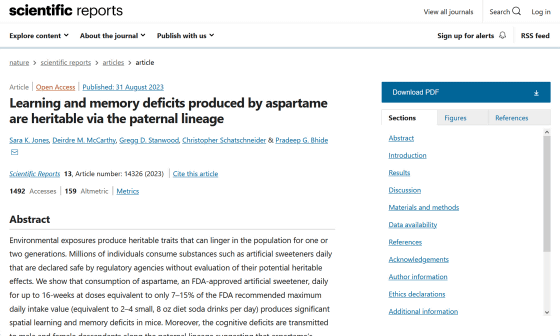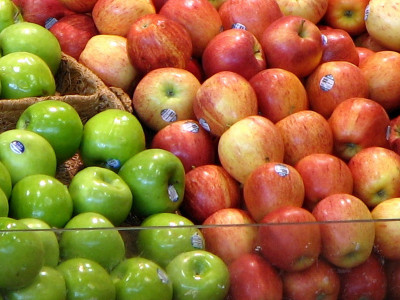Research results show that mice that continue to ingest the artificial sweetener ``aspartame'' have a decline in learning ability and memory, and the effects are passed on to children.

The artificial sweetener
Learning and memory deficits produced by aspartame are heritable via the paternal lineage | Scientific Reports
https://www.nature.com/articles/s41598-023-41213-2

College of Medicine researchers discover learning and memory deficits after ingestion of aspartame - Florida State University News
https://news.fsu.edu/news/health-medicine/2023/09/18/college-of-medicine-researchers-discover-learning-and-memory-deficits-after-ingestion-of-aspartame/
Mice Fed Low Levels of Aspartame Passed on Learning Deficits to Their Offspring : ScienceAlert
https://www.sciencealert.com/mice-fed-low-levels-of-aspartame-passed-on-learning-deficits-to-their-offspring
Aspartame is an artificial sweetener that is widely used around the world, but research has also shown that it is carcinogenic. In response to these research results, the International Agency for Research on Cancer (IARC), a member of the World Health Organization (WHO) , is considering classifying aspartame as a carcinogen , and doubts have often been raised about its safety. Masu.
A research team from the Florida State University School of Medicine investigated the effects of continuously feeding mice with aspartame-containing water on their cognitive performance. In the experiment, adult male mice were divided into groups that drank plain water, a group that drank water containing 0.015% aspartame, and a group that drank water containing 0.03% aspartame.They were given the same drink for up to 16 weeks. continued to give.
Considering the average body weight of mice and the average amount of water consumed per day, mice in the group drinking water containing 0.015% aspartame received 43.2 mg/kg per day, and the mice drinking water containing 0.03% aspartame per day. The mice in the 'group' were calculated to have ingested 86.4 mg/kg of aspartame per day. With further adjustments based on pharmacokinetics and body surface area, the amount of aspartame ingested is 0.015% compared to the maximum dose of 50 mg/kg that the U.S. Food and Drug Administration (FDA) considers safe in humans. 7% of the mice in the group drinking water containing 0.03% aspartame, and 15% in the group drinking water containing 0.03% aspartame.
The average intake of aspartame in humans is estimated at 4.1 mg/kg per day (equivalent to 500 ml of diet soda per day), which is far below the FDA's recommended amount. This seems to be about the same level as the mice in the ``group drinking water containing 0.015% aspartame'' in this experiment.

When these mice were subjected to cognitive function tests using the Y-maze and Barnes maze , it was found that the mice that took aspartame had significantly worse performance in spatial learning and working memory.
For example, in the Barnes maze, a mouse was placed on a circular platform and had to find 40 holes that led to an escape box. Mice that drank plain water without aspartame were able to find the escape box quickly, but mice that drank water containing aspartame took longer. Furthermore, the difference in the amount of aspartame ingested did not result in a significant difference in the results.
Additionally, offspring born to male mice who continued to ingest aspartame and female mice who drank plain water had lower spatial They also performed worse on tests of learning and working memory.
A paper published in 2022 by the same research team confirmed that aspartame consumption increased anxiety in mice, and that the effects were passed down to their grandchildren. Pradeep Bhide, a developmental neurologist and co-author of the study, said, ``This study found that aspartame's effects are on a different cognitive function than anxiety behavior, so the effects of aspartame are different from previous papers. 'It's much more widespread than we had suggested.' On the other hand, the effects on cognitive function shown in this study stopped in children's generations and were not passed on to grandchildren.
Mouse experiments confirm that the popular artificial sweetener aspartame increases anxiety - GIGAZINE

It is not clear how aspartame affects the brain, but the research team believes that changes in neurotransmitter signaling, particularly in the amygdala, may have various effects. .
The research team said: ``The important public health implications of our findings are that the population at risk of aspartame's negative effects on learning and memory may be larger than current estimates that consider only directly exposed individuals.'' The point is that there is a gender,” he concluded.
Related Posts:






